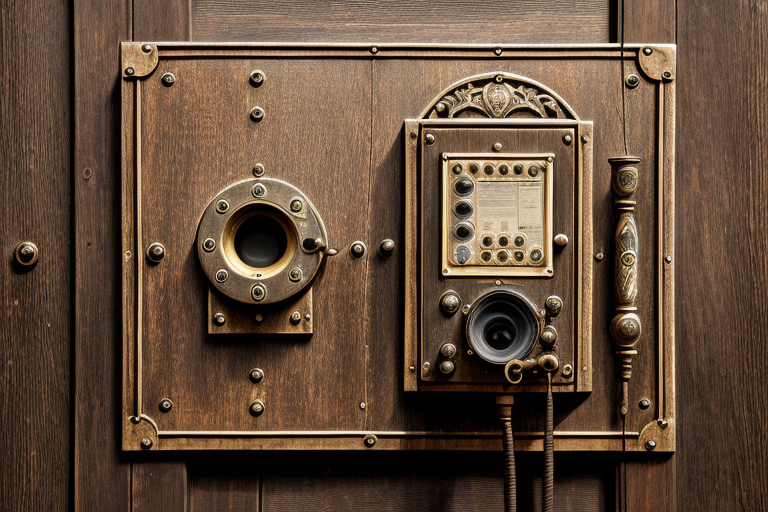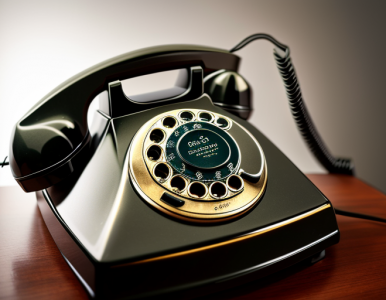This article delves into the fascinating origins of the telephone, shedding light on the brilliant inventors who played a pivotal role in its creation. From Alexander Graham Bell to Elisha Gray, Antonio Meucci, and Johann Philipp Reis, each inventor contributed to the development of this groundbreaking communication device. Through their ingenuity and determination, they revolutionized the way we connect and interact with one another.
By exploring the timeline of telephone invention, we can trace the evolution of this remarkable technology from its early conceptualization to the groundbreaking inventions that shaped our modern world. Additionally, we will explore the profound influence of the telephone on society, communication, and technological advancements. From telecommunication innovations to the global communication revolution, the telephone has left an indelible mark on our lives.
Alexander Graham Bell
Alexander Graham Bell, a renowned inventor, is credited with inventing the first practical telephone, a revolutionary device that forever changed communication. Born on March 3, 1847, in Edinburgh, Scotland, Bell displayed an early interest in sound and communication. His experiments and research led to the development of the telephone, which he patented on March 7, 1876.
Bell’s invention of the telephone was a groundbreaking achievement that allowed people to communicate over long distances like never before. His design utilized a simple yet ingenious mechanism that converted sound waves into electrical signals, which could then be transmitted and received by another device. This invention paved the way for the modern telephone systems we use today.
Early Telephone Innovations
Before Alexander Graham Bell’s groundbreaking invention of the practical telephone, there were several pioneers and inventors who made significant contributions to the development of this revolutionary communication device. These early innovations laid the foundation for Bell’s later breakthrough and shaped the future of telecommunications.
One notable figure in the early history of the telephone is Elisha Gray. On the same day that Bell filed his patent for the telephone, Gray also submitted a patent for a similar device. This led to a fierce controversy over who should be credited as the true inventor of the telephone. Despite the controversy, Gray’s work remains an important part of the telephone’s history.
Another inventor who played a role in the early development of the telephone is Antonio Meucci. Meucci, an Italian inventor, is believed by some to have created a working telephone before Bell. However, due to financial challenges, Meucci was unable to secure a patent for his invention, allowing Bell to take the spotlight.
Johann Philipp Reis, a German scientist, also made significant contributions to the development of the telephone. He invented a device capable of transmitting sound, often referred to as the Reis telephone, before Bell’s invention. Although Reis’ device was not as practical as Bell’s, it was an important step forward in the evolution of the telephone.
These early telephone innovators paved the way for Alexander Graham Bell’s groundbreaking invention and set the stage for the incredible advancements in communication technology that would follow.
Elisha Gray
Elisha Gray was a notable inventor who played a significant role in the development of the telephone. He is known for filing a patent for a telephone design on the same day as Alexander Graham Bell, which sparked a fierce controversy over who should be credited with the invention.
Gray’s design for the telephone was similar to Bell’s, using a liquid transmitter and a receiver that converted electrical signals into sound. However, Bell was ultimately granted the patent for the telephone, leading to ongoing debates and legal battles.
Despite the controversy surrounding the patent, Gray continued to make important contributions to the field of telecommunication. He went on to invent other devices and technologies, including the telautograph, a precursor to modern fax machines.
Gray’s work and his involvement in the telephone’s early development highlight the complex and competitive nature of invention during that time. His contributions, though overshadowed by Bell’s success, remain an important part of the history of the telephone.
Antonio Meucci
Antonio Meucci, an Italian inventor, is a significant figure in the history of telephone development. Some believe that Meucci created a working telephone before Alexander Graham Bell, but he faced financial challenges in securing a patent for his invention.
Meucci was born on April 13, 1808, in Florence, Italy. He immigrated to the United States in 1835 and settled in New York City. Throughout his life, Meucci was fascinated by the idea of transmitting sound over long distances, and he conducted numerous experiments to achieve this goal.
In 1857, Meucci filed a patent caveat for his invention, which described a device called the “teletrofono.” This device was capable of transmitting sound through electrical wires. However, due to financial difficulties, Meucci was unable to renew his patent caveat, and it expired in 1874.
Although Meucci’s contributions to telephone development were overshadowed by Bell’s success, his work and inventions played a crucial role in paving the way for future advancements in communication technology.
Johann Philipp Reis
Johann Philipp Reis was a German scientist who played a significant role in the development of the telephone. He is credited with inventing a device capable of transmitting sound, which is often referred to as the Reis telephone. Reis began his experiments in the early 1860s, aiming to create a device that could transmit human speech electrically.
Reis’s invention consisted of a vibrating membrane that would convert sound into electrical vibrations. These vibrations would then be transmitted through a wire and reconverted into sound at the receiving end. Although Reis’s device was able to transmit sound, it had limitations and was not as practical as the telephone invented by Alexander Graham Bell.
Despite its limitations, Reis’s invention laid the foundation for future advancements in telecommunications. His work paved the way for further experimentation and refinement, ultimately leading to the groundbreaking invention of the practical telephone by Alexander Graham Bell. Reis’s contributions to the field of communication technology are significant, and his invention played a crucial role in the development of the telephone as we know it today.
Reis telephone,
The Reis telephone, invented by Johann Philipp Reis, was a significant precursor to Alexander Graham Bell’s invention. Reis, a German scientist, developed a device capable of transmitting sound over a distance. Although it was not as advanced or practical as Bell’s telephone, the Reis telephone played a crucial role in the early development of telecommunications.
The Reis telephone consisted of a transmitter and a receiver. The transmitter converted sound waves into electrical vibrations, which were then transmitted through a wire. The receiver at the other end of the wire converted the electrical vibrations back into sound waves, allowing for communication between two points. While the Reis telephone had limitations and was not widely adopted, it laid the foundation for future advancements in telecommunication technology.
| Key Features of the Reis Telephone |
|---|
| Conversion of sound waves into electrical vibrations |
| Transmission of electrical vibrations through a wire |
| Conversion of electrical vibrations back into sound waves |
Although Alexander Graham Bell is often credited with inventing the telephone, it is important to recognize the contributions of Johann Philipp Reis and other early inventors. The Reis telephone paved the way for future advancements in telecommunications and set the stage for the transformative impact of the telephone on global communication.
before Bell’s invention.
Before Alexander Graham Bell’s groundbreaking invention of the telephone, there were several notable inventors who made significant contributions to the development of telecommunication technology. One such inventor was Johann Philipp Reis, a German scientist who created a device capable of transmitting sound, often referred to as the Reis telephone.
Reis’ invention, although not as practical as Bell’s telephone, laid the foundation for future advancements in communication technology. His device used a vibrating membrane to transmit sound, demonstrating the possibility of transmitting sound over long distances. However, it was limited in its ability to reproduce clear and intelligible speech.
Despite Reis’ contribution, it was Alexander Graham Bell’s invention that ultimately revolutionized communication. Bell’s telephone, with its ability to transmit clear and understandable speech, quickly gained popularity and became the foundation for modern telecommunication systems. Nevertheless, Reis’ early experiments and inventions played a crucial role in paving the way for Bell’s groundbreaking invention.
Timeline of Telephone Invention
The timeline of telephone invention is a fascinating journey that spans several decades and involves the contributions of various inventors. It all began with the early conceptualization of a device that could transmit sound over long distances. In the mid-19th century, inventors started experimenting with different technologies and designs to achieve this goal.
One of the key milestones in the timeline is the invention of the telegraph, which laid the foundation for the development of the telephone. The telegraph allowed for the transmission of coded messages over long distances using electrical signals. This breakthrough sparked the curiosity of inventors who sought to take communication to the next level.
Fast forward to 1876, when Alexander Graham Bell patented his invention of the telephone. This marked a significant turning point in the history of telecommunications. Bell’s telephone was the first practical device capable of transmitting clear and intelligible speech. It revolutionized communication, making it possible for people to connect with each other in real-time over long distances.
However, it’s important to note that Bell was not the only inventor working on telephone technology during this time. Elisha Gray, another notable inventor, filed a patent for a similar telephone design on the same day as Bell. This led to a fierce controversy over who should be credited with the invention. The dispute was eventually settled in favor of Bell, but Gray’s contributions should not be overlooked.
Another inventor worth mentioning is Antonio Meucci, an Italian inventor who is believed by some to have created a working telephone before Bell. However, Meucci faced financial challenges in securing a patent, which prevented him from gaining widespread recognition for his invention.
Overall, the timeline of telephone invention showcases the gradual evolution of communication technology and the contributions of various inventors. It is a testament to human ingenuity and the relentless pursuit of innovation.
Influence and Legacy
The invention of the telephone by Alexander Graham Bell had a profound influence on society, communication, and technological advancements. It revolutionized the way people connect and interact with one another, shaping the world as we know it today.
With the telephone, communication became faster, more convenient, and more accessible. It eliminated the need for physical letters or face-to-face meetings, allowing people to communicate instantly over long distances. This breakthrough in communication technology paved the way for further advancements in telecommunication.
The telephone also had a significant impact on businesses and personal interactions. It transformed the way businesses operated by enabling real-time communication and increasing efficiency. It connected people across vast distances, fostering global communication and breaking down barriers. The telephone played a crucial role in the globalization of businesses and the world at large.
Moreover, the invention of the telephone laid the foundation for future technological advancements. It served as a precursor to modern communication devices like smartphones, which have become an integral part of our daily lives. The telephone’s influence and legacy are evident in the way we communicate, work, and interact with technology today.
Telecommunication Advancements
Telecommunication advancements have come a long way since the invention of the telephone. The telephone served as the foundation for further technological breakthroughs in the field of communication. It paved the way for the creation of smartphones and other devices that have revolutionized the way we connect with others.
With the invention of the telephone, people were able to communicate over long distances like never before. This led to the development of telecommunication networks and infrastructure, enabling widespread connectivity. As technology progressed, telecommunication systems became more advanced, allowing for faster and more efficient communication.
One of the key advancements that followed the telephone was the introduction of mobile phones. These portable devices allowed individuals to communicate on the go, freeing them from the constraints of being tied to a landline. The advent of smartphones took this even further, providing not only voice communication but also internet access, messaging capabilities, and a wide range of applications.
Telecommunication advancements have also led to the development of various other devices that enhance communication. For example, we now have video conferencing systems that enable face-to-face communication even when individuals are in different parts of the world. Additionally, the Internet of Things (IoT) has emerged, connecting various devices and allowing for seamless communication between them.
In summary, the invention of the telephone laid the groundwork for telecommunication advancements that have shaped the way we communicate today. From the creation of mobile phones to the rise of smartphones and the development of various other communication devices, the impact of telecommunication advancements is undeniable.
Global Communication Revolution
The global communication revolution brought about by the telephone has had a transformative effect on society, connecting people across vast distances and revolutionizing business and personal interactions. Prior to the invention of the telephone, communication over long distances was limited to written letters or telegrams, which could take days or even weeks to reach their destination.
With the advent of the telephone, however, people could instantly communicate with each other, no matter how far apart they were. This revolutionized the way businesses operated, allowing for faster and more efficient communication between offices and branches located in different parts of the world. It also brought people closer together, enabling friends and family members to stay connected even if they were thousands of miles apart.
The telephone also played a crucial role in the globalization of trade and commerce. It facilitated the growth of international business relationships, making it easier for companies to conduct transactions and negotiate deals with partners from different countries. This led to a significant increase in global trade and economic integration, as businesses could now communicate and collaborate on a global scale.
Furthermore, the telephone revolutionized personal interactions, allowing individuals to connect with each other in real-time. People could now have conversations and share information instantaneously, fostering closer relationships and strengthening social bonds. It also provided a lifeline in times of emergencies, enabling individuals to quickly seek help or assistance when needed.
In summary, the global communication revolution brought about by the telephone has had a profound impact on society, connecting people across vast distances and revolutionizing business and personal interactions. It has transformed the way we communicate, breaking down barriers and bringing the world closer together.
Frequently Asked Questions
- Who is credited with inventing the first practical telephone?
Alexander Graham Bell is credited with inventing the first practical telephone.
- Were there any other inventors who made significant contributions to the development of the telephone?
Yes, there were other inventors who made significant contributions to the development of the telephone. Some notable inventors include Elisha Gray, Antonio Meucci, and Johann Philipp Reis.
- Did Elisha Gray file a patent for a telephone design on the same day as Alexander Graham Bell?
Yes, Elisha Gray filed a patent for a telephone design on the same day as Alexander Graham Bell, which sparked a controversy.
- Is it true that Antonio Meucci created a working telephone before Bell?
There is a belief that Antonio Meucci created a working telephone before Bell, but he faced financial challenges in securing a patent for his invention.
- What did Johann Philipp Reis invent?
Johann Philipp Reis invented a device capable of transmitting sound, often referred to as the Reis telephone, before Bell’s invention.
- Can you provide a timeline of telephone invention?
Yes, we can provide a timeline of telephone invention, tracing its development from the early conceptualization to the groundbreaking inventions of Bell and other inventors.
- How did the invention of the telephone impact society and communication?
The invention of the telephone had a profound impact on society and communication, revolutionizing the way people connect and interact with one another.
- Did the telephone lead to further advancements in telecommunication technology?
Yes, the invention of the telephone paved the way for further advancements in telecommunication technology, eventually leading to the creation of smartphones and other devices.
- How did the telephone revolutionize global communication?
The telephone revolutionized global communication by connecting people across vast distances, transforming business and personal interactions.






